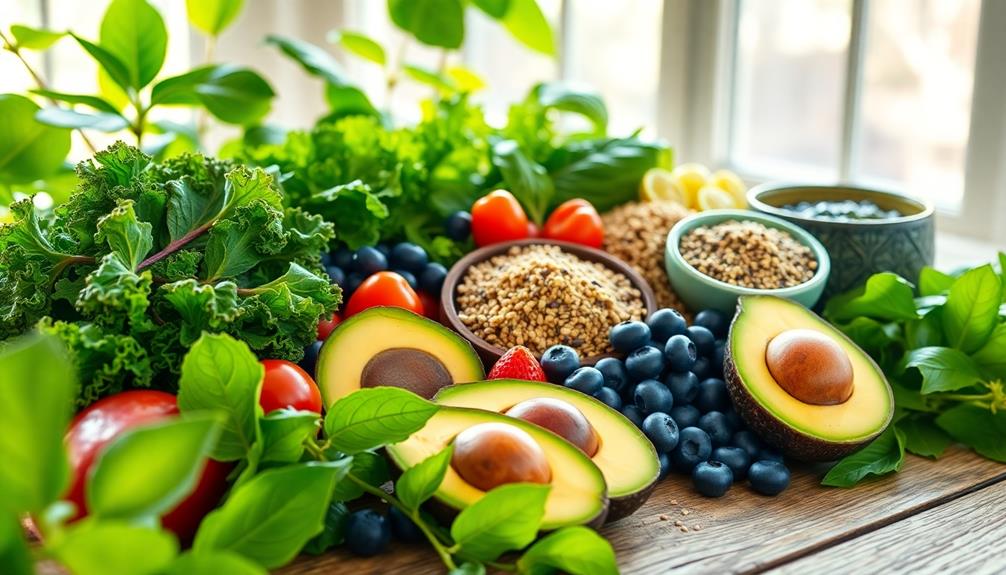Certain foods earn the 'superfood' label because they're packed with essential nutrients, antioxidants, and health benefits. These foods, like dark leafy greens, berries, and fatty fish, can boost your immune system, lower inflammation, and support heart health. Their high concentration of vitamins and minerals helps reduce the risk of chronic diseases. Incorporating these ingredients into your meals can enhance overall wellness and even aid in weight management. Superfoods are more than just a trend; they're key players in a balanced diet. Stick around to discover how you can easily include them in your diet for maximum health benefits.
Key Takeaways
- Superfoods are nutrient-dense, providing high levels of vitamins, minerals, and antioxidants essential for overall health and disease prevention.
- They have been shown to enhance immune function and reduce inflammation, promoting better health outcomes.
- Many superfoods, such as fatty fish and leafy greens, support heart health and cognitive function through their beneficial nutrient profiles.
- The term "superfood" emphasizes foods that offer exceptional health benefits, often backed by scientific research and consumer interest.
- Incorporating a variety of superfoods can improve dietary quality and help manage weight effectively due to their nutrient-rich composition.
Definition of Superfoods
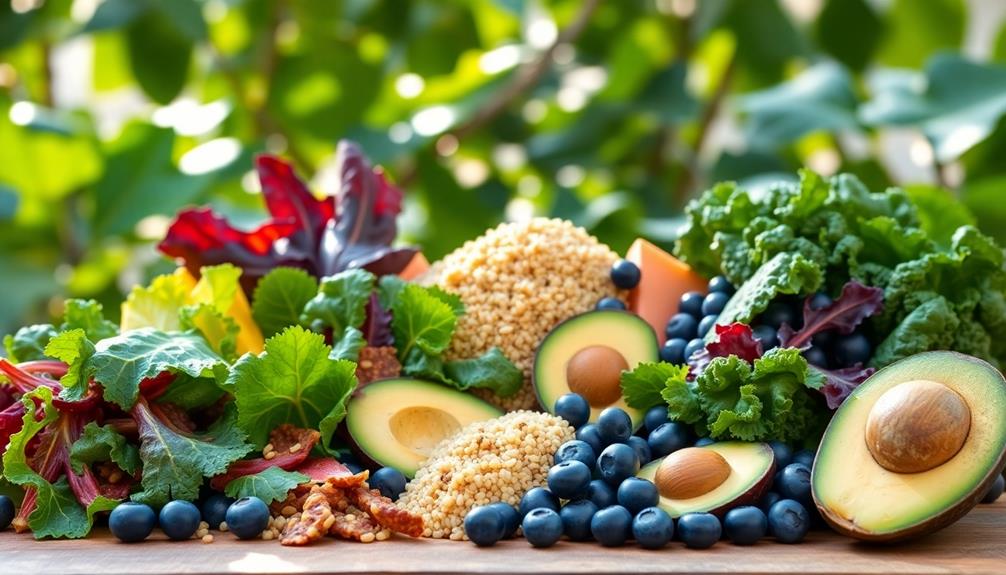
Defining superfoods involves understanding their unique nutritional profile and health benefits. Superfoods are typically natural foods that are nutrient-dense and low in calories, packed with vitamins and minerals. They stand out due to their high levels of antioxidants, which protect your cells and help lower the risk of chronic diseases.
For example, dishes like Red-Braised Pork Belly can provide a rich source of flavor and nutrients when made with high-quality ingredients. By incorporating superfoods into your diet, you can enhance your immune function and reduce inflammation, both essential for overall health.
These foods are rich in fiber, aiding in cholesterol reduction and glucose control, making them especially beneficial for heart health. Common examples of superfoods include dark leafy greens, berries, fatty fish, and nuts. Each offers specific health benefits; for instance, fatty fish are known for their omega-3 fatty acids, which can lower the risk of heart disease.
While the term "superfood" lacks strict criteria, its essence lies in the significant health-promoting properties these foods provide. By focusing on nutrient-dense choices, you can better support your body in fighting off diseases and maintaining ideal wellness.
Embracing superfoods in your meals can lead to a healthier, more vibrant life.
Historical Context of Superfoods

Emerging in the early 20th century, the term "superfood" was initially a marketing tactic used by The United Fruit Company to promote bananas as a nutritious and affordable option. Samuel C. Prescott emphasized the protective qualities of bananas, highlighting their skin's resistance to bacteria and decomposition. This contributed to their popularity as a health food.
In the 1920s, physicians endorsed bananas for various ailments, further enhancing their status as a superfood within the historical context of nutrition.
As consumer interest in health grew, the concept of superfoods gained traction throughout the 21st century. This was paralleled by a rising awareness of nutrient-rich foods in various global cuisines, including traditional Brazilian dishes that showcase the health benefits of local ingredients.
The rise of the internet and social media allowed for widespread marketing of nutrient-dense food products that promised significant health benefits. By 2015, food products labeled as superfoods surged by 36%, reflecting a growing demand for items rich in antioxidants and other beneficial nutrients.
This historical journey illustrates how marketing strategies can shape perceptions of food, elevating certain items to superfood status and influencing consumer choices. Brands and corporations have often leveraged emotional appeals, aspirational imagery, and selective health claims to position foods as essential for a better lifestyle. By tapping into the science behind food addiction, marketers have been able to exploit the brain’s reward system, creating cravings and fostering brand loyalty. This blend of psychology, biology, and strategic messaging highlights the profound impact of marketing on not just what we eat, but how we perceive the value of certain foods.
Today, you often see foods labeled as superfoods, reminding you of their evolving narrative rooted in health and nutrition.
Nutritional Benefits and Properties
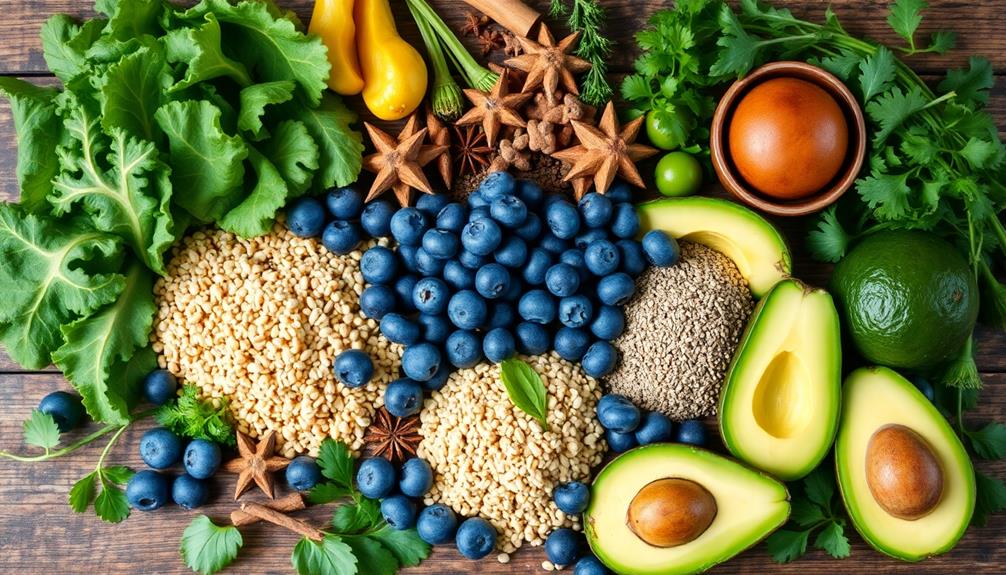
When you think about superfoods, it's easy to be drawn in by their promise of health benefits packed into a single bite. These nutrient-dense foods offer a high concentration of vitamins, minerals, and antioxidants without adding excessive calories.
For those interested in seasonal cooking, incorporating fresh ingredients like nettles and potatoes can enhance the nutritional profile of your meals. Here's why you should include them in your diet:
- Antioxidants: Foods like berries are rich in antioxidants, helping to reduce the risk of chronic diseases, including heart disease and cancer, by neutralizing harmful free radicals in your body.
- Leafy Greens: Varieties such as kale and spinach are high in vitamins A, C, and K, along with essential minerals like iron and magnesium. These nutrients contribute considerably to immune function and disease prevention.
- Omega-3 Fatty Acids: Fatty fish, particularly salmon, are high in omega-3 fatty acids, which improve heart health and cognitive function while reducing inflammation and chronic disease risks.
Incorporating superfoods into your meals can also aid in weight management. Foods like quinoa and legumes provide complete proteins and fiber, promoting satiety and supporting digestive health.
Embrace these nutritional powerhouses for a healthier you!
Popular Superfoods and Their Uses
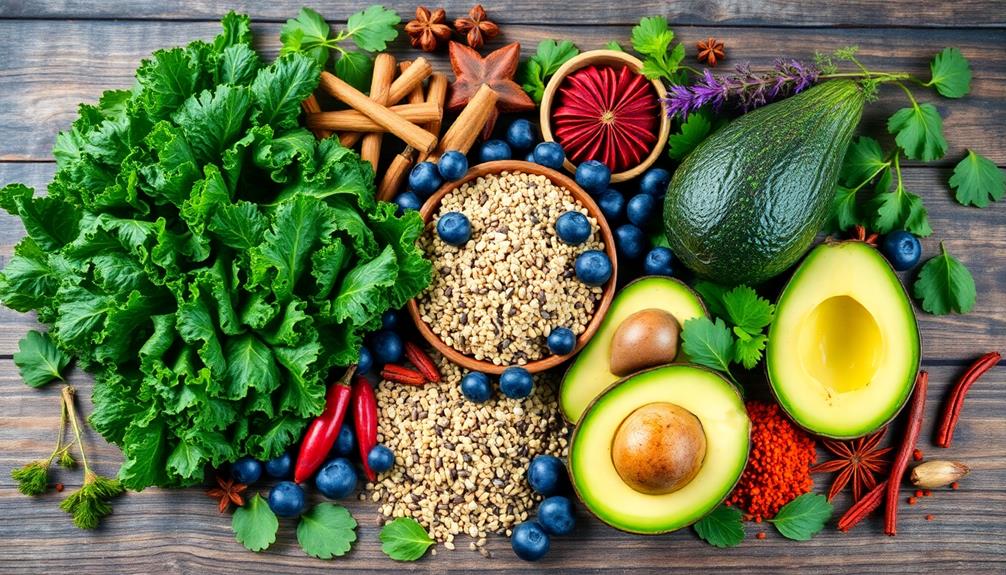
Exploring the world of superfoods reveals a variety of popular options that you can easily incorporate into your meals. For instance, avocados are packed with monounsaturated fats and potassium, making them excellent for heart health and cholesterol management.
In addition to these, incorporating dishes like Mushroom Masala can enhance your nutrient intake while providing a flavorful experience. When you add berries like blueberries and raspberries to your diet, you're boosting your intake of antioxidants and fiber, which are linked to a reduced risk of heart disease and inflammation.
Green tea is another fantastic superfood; it contains catechins, particularly epigallocatechin gallate (EGCG), known for its strong anti-inflammatory properties and potential weight loss benefits.
Don't forget about salmon! This fatty fish is rich in omega-3 fatty acids, essential for cardiovascular health and brain function—aim for at least two servings per week.
Incorporating Superfoods Into Your Diet
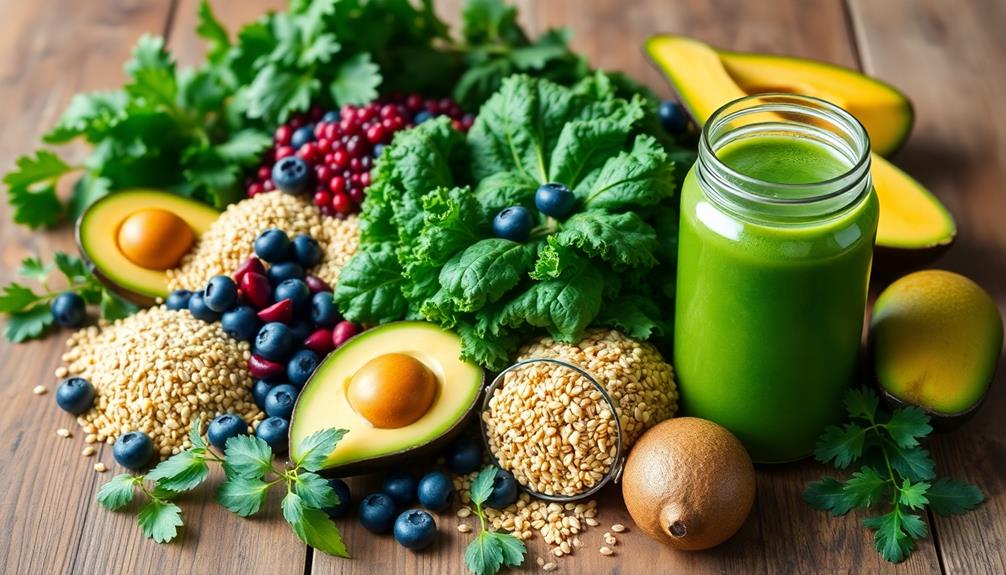
You can easily incorporate superfoods into your diet with some creative recipe ideas and daily serving suggestions.
For instance, try adding Umeboshi to your rice dishes for a tangy kick or blend berries and chia seeds into your morning smoothie.
Tossing leafy greens with olive oil can also create a nutrient-packed salad.
Creative Recipe Ideas
Elevate your meals by incorporating superfoods that not only enhance flavor but also boost your nutritional intake. These creative recipe ideas will help you meet your nutritional needs while enjoying healthy food.
For instance, consider adding Agnolotti pasta filled with nutritious vegetables to your diet, which showcases the culinary traditions of Northern Italy.
- Berry Parfait: Layer yogurt with mixed berries and a sprinkle of nuts. This delicious combo delivers probiotics for gut health and antioxidants that can reduce the risk of heart disease.
- Chia Seed Pudding: Mix chia seeds with almond milk and let it sit overnight. This easy treat is packed with fiber and omega-3 fatty acids, promoting digestive health and heart function.
- Quinoa Salad Bowl: Use quinoa as a base and toss in your favorite veggies, such as spinach and kale. These dark leafy greens are rich in vitamins A, C, and K, along with antioxidants that may help reduce cancer risk.
Daily Serving Suggestions
Incorporating superfoods into your daily routine can greatly enhance your overall health and well-being. Start your day with a serving of dark leafy greens like kale or spinach. These nutritious whole foods are packed with essential vitamins A, C, and K, and fiber, helping to reduce your risk of chronic illnesses.
Additionally, including ingredients like Muamba De Galinha can introduce rich flavors and nutritional benefits from traditional Angolan cuisine. Additionally, including ingredients like Muamba De Galinha can introduce rich flavors and nutritional benefits from traditional Angolan cuisine. The combination of spices, palm oil, and tender chicken in this dish offers a depth of taste that harmonizes effortlessly with other global flavors. Understanding why flavors complement each other allows for more creative culinary experimentation, bridging diverse cuisines in exciting and delicious ways. By incorporating such traditional elements, meals can become both culturally enriching and unforgettable.
For a tasty snack or breakfast addition, throw a handful of berries, such as blueberries or strawberries, into your meal. These fruits are rich in antioxidants that combat inflammation and lower your risk of heart disease.
Aim to enjoy fatty fish, like salmon or mackerel, at least twice a week. The omega-3 fatty acids in these fish support heart health and cognitive function.
When preparing your meals, consider adding a tablespoon of chia seeds or ground flaxseeds to your smoothies or oatmeal. These superfoods provide added fiber and protein, which can aid in weight management and digestive health.
Risks and Considerations of Superfoods
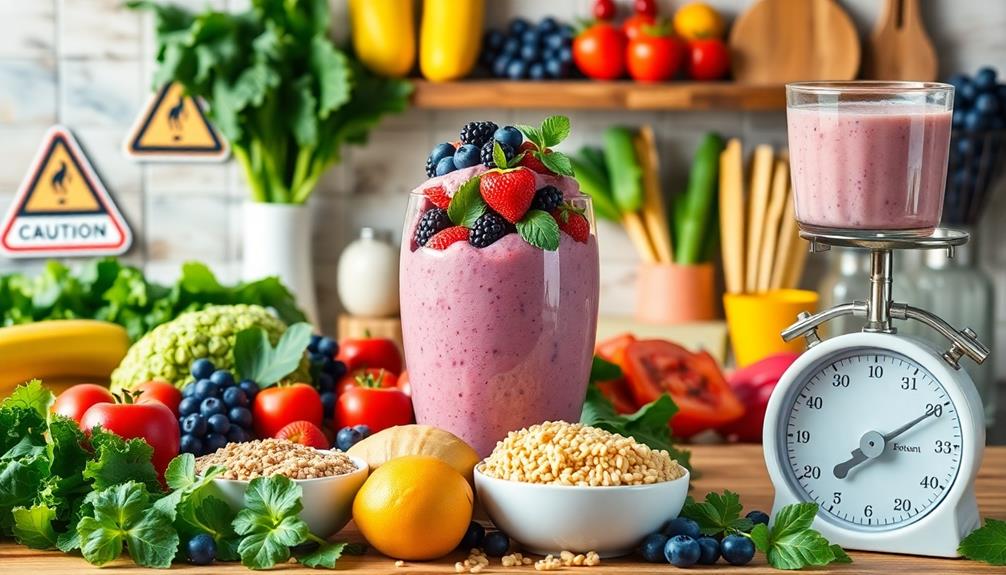
Navigating through the world of superfoods requires caution, as these nutrient-dense options can come with risks and aspects that aren't always apparent. While superfood supplements often boast impressive health benefits, their nutrient composition can differ considerably from whole foods, potentially leading to adverse interactions with medications.
Additionally, it's important to reflect on how whole foods like leftover turkey or pumpkin roll can contribute to your overall diet, providing not only nutrition but also enjoyment during gatherings and celebrations.
Here are three key risks to keep in mind:
- Vitamin Toxicity: Consuming superfood supplements in excess can result in harmful levels of certain nutrients. Always be mindful of your intake.
- Neglecting Dietary Variety: Relying too heavily on superfoods may cause you to overlook the importance of a diverse diet, which is vital for thorough nutrition.
- Misleading Marketing Tactics: Be wary of exaggerated claims surrounding superfoods. Not all products deliver on their promises, so evaluating their true health benefits is vital.
Before adding any new superfood supplements to your diet, consult healthcare providers to guarantee safety and effectiveness.
Balancing your diet with a variety of whole foods, including options like turkey sandwiches or comforting turkey soup, will help you achieve ideal nutrition without the risks associated with over-reliance on superfoods.
Frequently Asked Questions
Why Are Some Foods Called Superfoods?
Some foods are called superfoods because they're packed with vitamins, minerals, and antioxidants. You'll find these nutrient-dense options often provide health benefits, making them popular choices for enhancing your diet and overall well-being.
Which Foods Are Considered Superfoods?
Think of nature's bounty—berries, leafy greens, fatty fish, quinoa, and avocado—each brings unique benefits. Incorporating these superfoods into your diet can boost your health, enhance vigor, and support your overall well-being effortlessly.
Is Every Food a Superfood?
Not every food's a superfood. While some are nutrient-dense, many lack the high nutritional density that defines a superfood. It's essential to enjoy a variety of foods for balanced nutrition rather than focusing solely on a few.
Who Decides Which Foods Get to Be a Superfood?
You might think a secret society decides which foods become superfoods, but it's really a mix of nutrition experts, savvy marketers, and consumer buzz that pushes certain foods into the limelight. It's a whirlwind!
Conclusion
Incorporating superfoods into your diet can truly enhance your health, with studies showing that consuming just one serving of blueberries a day may reduce your risk of heart disease by 15%. As you explore these nutrient-packed options, remember to balance them with a variety of other foods for ideal nutrition. Embracing superfoods isn't just a trend; it's a tasty way to nourish your body and support overall wellness. So, why not start today?
